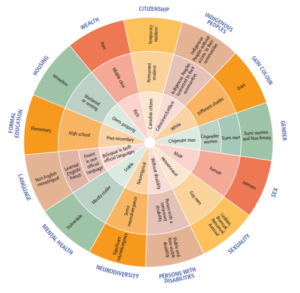Many of us do not think much about characteristics that put us in a majority, minority or under-represented group; or whether and to what extent we are privileged.
However, to implement and support an Equity, Diversity and Inclusion agenda, it helps if you understand the barriers other people face as well as your own privilege.

Please read through the following statements – the more questions you agree with the fewer societal barriers you will face and the more privileged you are.
The leader of my country is also a person of my racial group.
It is worth considering that laws and the governmental system are created by and for people from the majority ethnic group.
In public, I can kiss and hold hands with the person I am in a relationship with without fear.
Heterosexual, cis-gendered people can express affection freely and openly without fear of discrimination, this is not true of many people from the LGBTQ+ community.
Most of the religious and cultural holidays celebrated by my family are recognised with days off.
Many people celebrate religious and cultural holidays that are not recognised by mainstream society.
I do not worry about walking home late at night.
Women often report anxiety when walking outside late at night (although it should be recognised that some men may be fearful of this too).
There were more than 50 books in my house growing up.
Those that answered yes will likely have grown up in a middle-class household with access to resources that enhanced their understanding and educational potential.
If I go out, I do not need to consider if there will be a public toilet I will be able to use.
A wheelchair won’t fit through a toilet door where that toilet was designed for an able-bodied person. Finding a public toilet that can accommodate a wheelchair is a big problem for wheelchair users.
I’m not considered ‘weak’ if I cry in public.
Men may feel that crying in public is not acceptable, even if it’s something that they want to do.
My parents felt the need to discuss racism with me when I was young.
People from ethnic minorities will have likely been made aware of discrimination by their parents when they were little.
My professionalism is never questioned because of my age.
Older people may suffer discrimination at work, with others perhaps presuming that they lack vitality or energy, or that they are less sharp than younger people.
I feel comfortable wearing the style of dress that most reflects my identity in public.
People from different ethnicities may have traditional dress that is a big part of their identity but is not welcomed by mainstream society.
